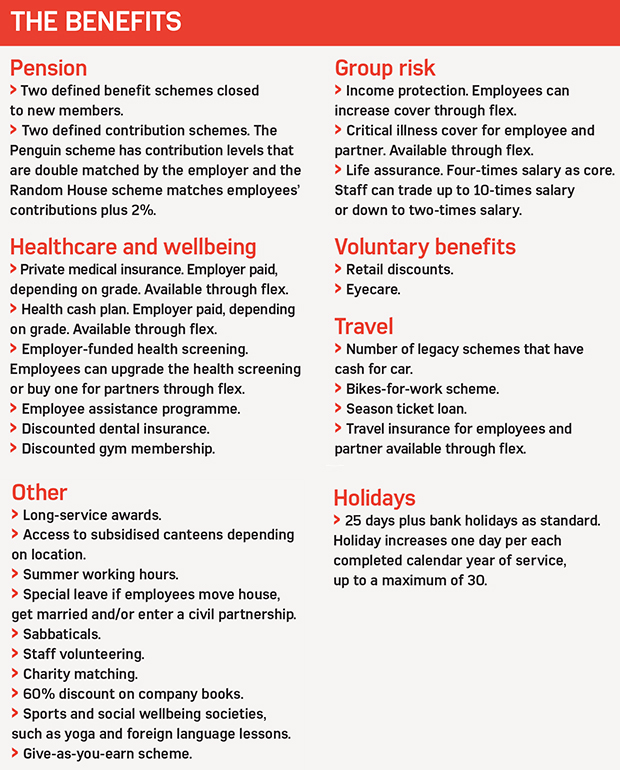Penguin Random House was formed in July 2013 following the merger of Penguin Books and Random House.

Now one of the world’s largest trade publishers, the merger presented a number of challenges and opportunities for the organisation, not least when it came to harmonising its employee benefits package.
Alongside the harmonisation project, the organisation identified an opportunity to simultaneously review its health and wellbeing offering .
Neil Morrison, group HR director at Penguin Random House, says: “When we merged in July 2013, we said we wanted to harmonise and re-launch in March [2014] as well as have a rethink of healthcare and wellbeing . People thought we were nuts. It gave us little under eight months to be prepared.
“What we chose to do was tackle the entirety of benefits for both sets of employees. Everything altered in some shape or form.”
The result was the launch of a flexible benefits plan , provided by Thomsons Online Benefits, which is intended to offer all employees full flexibility over their benefits. This also means that those who wish to replicate their pre-merger package are able to do so.
“While we created a harmonisation treatment of benefits , if an employee valued the benefits they had before it meant they could still have them, although the organisation may not be funding the benefit like before,” says Morrison.
The harmonisation of benefits also meant that all employees were transferred onto the same holiday structure. In addition, employer-funded cover of some benefits was extended, dependent on employees’ grades.
The flexible benefits scheme was rolled out to the majority of employees in March 2014. It will be available to all employees in every business area by the end of March 2015. The last to move onto the system will be the organisation’s distribution workers.
Morrison says: “There were time constraints but we launched 95% on time. It was a massive amount of work to roll out of London and other areas, especially to our distribution centres. They do not have email access, [because] we have only just started to move to a centralised account, which meant we have had to do staff briefings and tours to explain and reduce the level of fear.
“There was a huge amount of work done to go live and of course we hit blockages, for example with our pension schemes and working with trustees, [which] can be time consuming.”
To keep things fresh going forward, the organisation will update its benefits technology in order to make the benefits portal more accessible for staff to use, as well as add employer branding to the platform. It will also add new benefits in order boost the offering for employees.
“For me, it is about putting control in the employees’ hands,” says Morrison. “Technology allows us to do that and we have been able to improve it a year on from when we first started.
”Then we had no brand but now we have. It is about giving employees everything they need to know to let them interact when it suits them best. We now have the ability to use videos and images in an engaging way to help people make their selections. Technology is important and it helps build trust.”
During the benefits harmonisation process, a key focus for Penguin Random House was on combining health and wellbeing with its family-friendly policies . It reviewed its employee healthcare package at the time of harmonisation and has continued to make a strong link between health and family-friendly policies.
“If you look at our gender [demographics], some 60% of our workforce is female. What we do around family-friendly [benefits] has to be important and quite strong. The link of combining health and family friendly is all about treating employees as whole beings and understanding what they need, whether this is through running classes, yoga or our wellbeing weeks but we need it to cross over into childcare, flexibility and so on. It has been ongoing for two to three years.”
The organisation also wants to ensure it caters for those that do not have families. To offer something for all staff, it also launched an employee discounts scheme and measures to allow employees to level down the amount of life assurance cover available to them.
Morrison adds: “You always get some level of friction. You need to look at age and the gender balance to play with an audience that appreciates interventions and benefits in different spaces. If we do what is right and they feel cared for, staff are more likely to do good work and will want to stay.”
But the organisation is far from resting on its laurels when it comes to benefits. Although it has currently has a 95% engagement score based on the results of its internal employee engagement survey, Morrison explains that it is working towards ensuring an employee’s benefits package evolves in line with their life stages and employment journey with the organisation.
“When we merged, we reduced the number of career opportunities,” he says. “We want things to change and adapt as employees go through their career and it is good to recognise a change in their circumstances too. People can suddenly move internally and we want our benefits to help create that journey.
“It is about being creative in the industry we are in, after all, we have creative employees. One thing we are interested in is learning how to adapt and allow people to purchase our foreign language classes or music lessons through flex. For example, they could sell holiday to pay for a new music lesson. That is our next move.”

Career history: Neil Morrison
Neil Morrison was appointed group HR director for the combined businesses , having worked on the merger of Penguin and Random House, which took place on 1 July 2013. He joined Random House from 2008.
Prior to that, he was HR manager at Home Retail Group, where he focused on a number of generalist and specialist areas that included employee relations, resourcing and learning and development.
He says: “One of the things I love about HR is you can go and work in any sector and learn about what they do and not be stuck. You can find out about the business and engage with it.”
Penguin Random House at a glance
Penguin Random House is one of the world’s largest trade publishers, formed from the merger of Penguin Books and Random House in 2013. It employs more than 10,000 people globally across five different continents. The organisation comprises almost 250 editorially and creatively independent imprints and publishing houses that collectively publish more than 15,000 new titles annually.
Its headquarters are located in New York but it has offices around the world including in London.
In the UK, Penguin Random House has 60% female and 40% male employees with its largest age demographic being between the ages of 25 and 34 (33%). Employees have an average length of service of eight years.
Business objectives affecting benefits
- Creating a compelling offer through benefits that may not be employer funded
- Attracting employees that may not have considered a career in publishing
- Rolling out benefits for all employees

thanks again for the great list. kudos for the informative site. I dig it. cheers
95 percent engagement score is quite great. Well done.